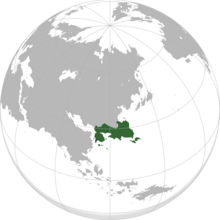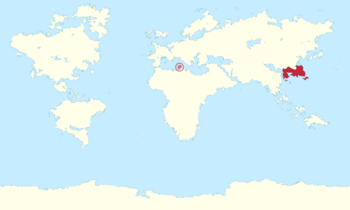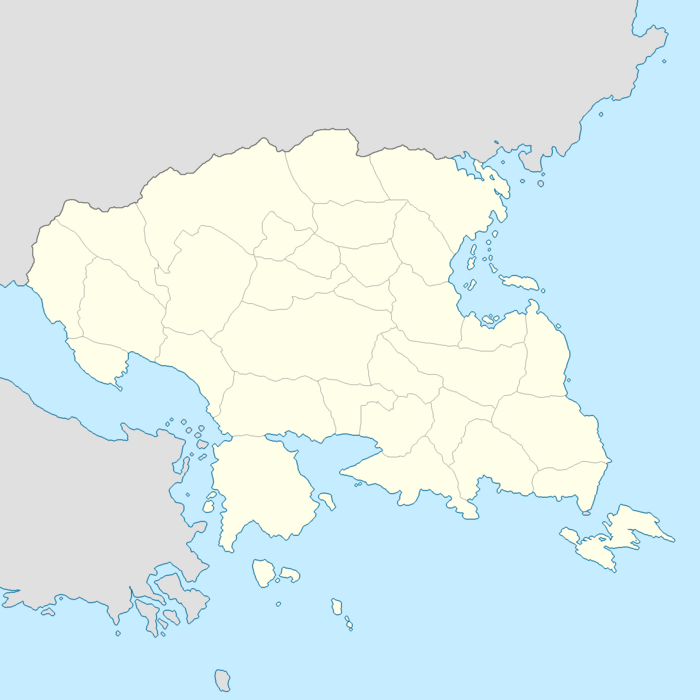Chilokver
Jump to navigation
Jump to search
This article is incomplete because it is pending further input from participants, or it is a work-in-progress by one author. Please comment on this article's talk page to share your input, comments and questions. Note: To contribute to this article, you may need to seek help from the author(s) of this page. |
Republic of Chilokver | |
|---|---|
|
Flag | |
| Motto: E Pluribus Unum (Arlesian) "Out of many, one" | |
| Anthem: "We are Chilokveri" | |
 Area controlled by Chilokver shown in green; claimed but uncontrolled regions shown in light green | |
 Area controlled by Chilokver, including dependent territories, shown in red | |
| Capital | Apelia |
| Largest city | Jiafen |
| Official languages | Standard Chilokveri · Cambrian |
| Demonym(s) | Chilokveri |
| Government | |
| Ada Luong | |
| TBA | |
| TBA | |
| TBA | |
| TBA | |
| Legislature | National Assembly |
| Council of States | |
| Congress of Deputies | |
| Independence from | |
• Chaeyoungi Empire | 1839 |
• Yaoist regime falls | 1965 |
• Ratification of constitution | 1986 |
| Area | |
• Total | 4,213,783 km2 (1,626,951 sq mi) |
| Population | |
• 2019 estimate | 193,546,585 |
• 2014 census | 189,816,195 |
• Density | 45.93/km2 (119.0/sq mi) |
| GDP (PPP) | 2018 estimate |
• Total | $8.15 trillion |
• Per capita | $42,337 |
| GDP (nominal) | 2018 estimate |
• Total | $8.77 trillion |
• Per capita | $45,509 |
| Gini (2018 (est.)) | 34.0 medium |
| HDI | very high |
| Currency | Chilokveri credit (₡) (CLC) |
| Time zone | UTC+8 to +10 |
| Date format | dd/mm/yyyy |
| Driving side | left |
| Calling code | +648 |
| ISO 3166 code | CL |
| Internet TLD | .cl |
Chilokver (Chilokveri: Tīnh Gwok), officially the Republic of Chilokver (ROC; Chilokveri: Tīnhhahmàhn Guhngwòhgwok), is a sovereign state in East Serica.
Etymology
Chilokver is pronounced as either /tʃilɒxvɜːr/ CHEE-lokh-vur or /tʃɛlɒxvɜːr/ CHEH-lokh-vur
History
Prehistory
Chilokveri Civilization
Carlosian Rule
Independence
Chaeyoungi Empire
Rise of the Yaoist Regime
Fall of the Yaoist Regime
Politics
Government
Foreign relations
Military
Administrative divisions
Districts

| District | Capital | Area (sq km) |
Population (2014 census) |
Density (per km2) |
GDP (CL₡) |
GDP per capita (CL₡) |
|---|---|---|---|---|---|---|
| Gipguk | TBA | TBA | TBA | TBA bn | TBA | |
| Linglaai | TBA | TBA | TBA | TBA bn | TBA | |
| Jungyeh | TBA | TBA | TBA | TBA bn | TBA | |
| Mukhak | TBA | TBA | TBA | TBA bn | TBA | |
| Ngahnjoh | TBA | TBA | TBA | TBA bn | TBA | |
| Seuhngyeh | TBA | TBA | TBA | TBA bn | TBA | |
| Fungjau | TBA | TBA | TBA | TBA bn | TBA | |
| Luhkbunmuhk | TBA | TBA | TBA | TBA bn | TBA | |
| Dungyeuhng | TBA | TBA | TBA | TBA bn | TBA | |
| Seichyunguk | TBA | TBA | TBA | TBA bn | TBA | |
| Gotsai | TBA | TBA | TBA | TBA bn | TBA | |
| Yahtbeiguk | TBA | TBA | TBA | TBA bn | TBA | |
| Gammihktihng | TBA | TBA | TBA | TBA bn | TBA | |
| Sahnbou | TBA | TBA | TBA | TBA bn | TBA | |
| Dihkwa | TBA | TBA | TBA | TBA bn | TBA | |
| Douhtihn | TBA | TBA | TBA | TBA bn | TBA | |
| Jukdeih | TBA | TBA | TBA | TBA bn | TBA | |
| Muhkcheuhng | TBA | TBA | TBA | TBA bn | TBA | |
| Wohngji | TBA | TBA | TBA | TBA bn | TBA | |
| Gwongmeih | TBA | TBA | TBA | TBA bn | TBA | |
| Sahntihn | TBA | TBA | TBA | TBA bn | TBA | |
| Hahngdak | TBA | TBA | TBA | TBA bn | TBA | |
| Miuhdin | TBA | TBA | TBA | TBA bn | TBA | |
| Pihngwotoih | TBA | TBA | TBA | TBA bn | TBA | |
| Saamleuhn | TBA | TBA | TBA | TBA bn | TBA | |
| Chinchyun | TBA | TBA | TBA | TBA bn | TBA | |
| Naahmfong | TBA | TBA | TBA | TBA bn | TBA | |
| Tongdou | TBA | TBA | TBA | TBA bn | TBA | |
| Yahpguk | TBA | TBA | TBA | TBA bn | TBA | |
| Sahnjih | TBA | TBA | TBA | TBA bn | TBA | |
| Chintohmuhk | TBA | TBA | TBA | TBA bn | TBA | |
| Ganjeun | TBA | TBA | TBA | TBA bn | TBA | |
| Lohkhahp | TBA | TBA | TBA | TBA bn | TBA | |
| Jimauh | TBA | TBA | TBA | TBA bn | TBA |
Geography
Location
Flora and Fauna
Economy
Demographics
Religion
Culture
Cuisine
Sport
Music
See also
- History of Chilokver
- Politics of Chilokver
- Districts of Chilokver
- Foreign relations of Chilokver
- Chilokveri Armed Forces
- Law of Chilokver
- Judiciary of Chilokver
- Geography of Chilokver
- Climate of Chilokver
- Environment of Chilokver
- Wildlife of Chilokver
- Economy of Chilokver
- Transport in Chilokver
- Energy in Chilokver
- Science and technology in Chilokver
- Demographics of Chilokver
- Languages of Chilokver
- Religion in Chilokver
- Education in Chilokver
- Health in Chilokver
- Culture of Chilokver
- Chilokveri cuisine
- Chilokveri literature
- Music of Chilokver
- Sport in Chilokver
- Public holidays in Chilokver
- Media of Chilokver
- Chilokveri philosophy
- Cinema of Chilokver
